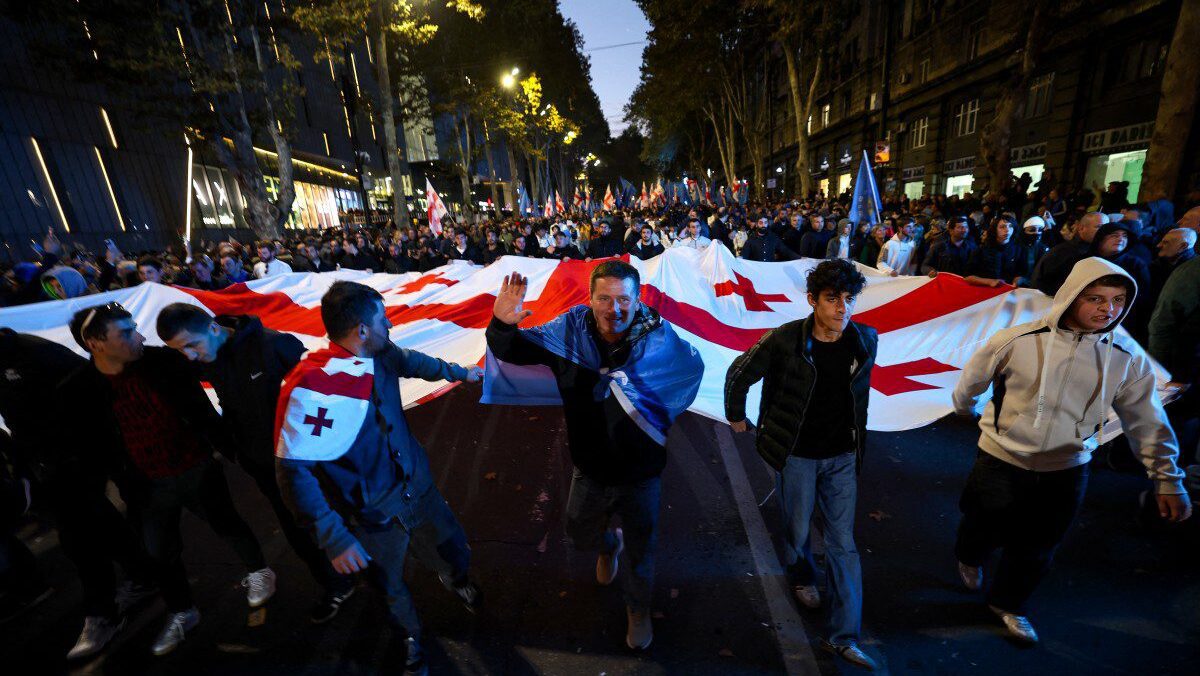
Supporters of the ruling Georgian Dream party attend the party’s final campaign rally in Tbilisi on October 23, 2024, ahead of October 26 parliamentary elections.
Photo: Giorgi ARJEVANIDZE / AFP
The citizens of Georgia are heading to the polls on Saturday, October 26th, in what is being framed in Western liberal media as one of the most hotly-contested elections in the country’s history, a geopolitical tussle between the ‘pro-Russian’ forces of evil and the ‘pro-Western’ good guys.
The reality is, of course, a lot less simplistic than that.
The ruling conservative Georgian Dream party, which has governed the small eastern European country for the past twelve years, has not veered the country off its course towards joining the European Union, but has simply approved a number of laws that are not in line with what Brussels likes to call “European values.”
Brussels decided to freeze Georgia’s EU accession process earlier this year after the country’s parliament voted in favour of a foreign interference law, which obliges NGOs and media outlets receiving more than 20% of their funding from abroad to register as “pursuing the interests of a foreign power,” and provide more detailed reports on their finances and activities.
Despite the act of legislation resembling the EU’s own ‘Defence of Democracy’ package, as well as the United States Foreign Agents Registration Act, Brussels and the Joe Biden-led U.S. administration derided Georgia for following in the footsteps of Russia’s foreign agent law.
The harsh Western criticism may have had something to do with the fact that Georgian Dream is trying to pursue a sovereigntist agenda and has visibly embraced Christian and conservative values—definitely not to the liking of the globalist elites.
Last month, the parliament adopted a law aiming to safeguard traditional family values, which outlaws same-sex marriage, adoption by same-sex couples, gender reassignment surgeries, promotion of homosexuality and gender transition in media and advertisements, and any kind of display or promotion of LGBT ideology in schools.
Brussels immediately sounded the alarm, with EU foreign affairs chief Josep Borrell demanding that Georgia withdraw the law and urged the government to “recommit” to “European values.”
Brussels has made it evidently clear whom it supports in the upcoming elections. Borrell warned earlier this month that Georgian Dream’s actions “signal a shift towards authoritarianism,” and that the elections would be “a crucial test for democracy in Georgia and its European Union path.” His words could not have been interpreted in any other way than as a threat that Brussels will derail the eastern European country’s path to the EU unless it does as it’s told.
“By 2030, we will become a member of the European Union—with dignity, with respect for Christianity, the Church, morality, independence and sovereignty,” Prime Minister Irakli Kobakhidze told a rally on Wednesday, insisting on maintaining a pro-European course. He criticised the liberal elites by saying:
The injustice of EU politicians and officials does not suit Europe, the rejection of Christian dogmas does not suit Europe, LGBT propaganda does not suit Europe, and disrespect for others’ sovereignty does not suit Europe.
Georgia, with a population of 3.7 million, lies in the Caucasus region and is bordered by Russia. It has been one of the staunchest pro-EU countries in eastern Europe since its independence from the Soviet Union in 1991. The country applied for EU membership two years ago and was granted candidate status in December of last year. 80% of Georgians support EU accession.
Georgian Dream’s campaign has centred on the theme that a “global party of war” and Western institutions are seeking to drag Georgia into the Russia-Ukraine war. Accusations of harbouring pro-Russian sympathies have been rejected by the ruling party, with the prime minister saying it only wants to maintain a pragmatic relationship with Moscow.
Around Tbilisi, billboards show pristine Georgian cities alongside devastated Ukrainian ones, above a caption reading “No to war! Choose peace.”
According to opinion polls, the ruling party will be the single strongest political force following Saturday’s election with 34-36% support, but a coalition of pro-Brussels political alliances could garner more votes and form a rainbow coalition.
Georgia, Edison Research poll:
— Europe Elects (@EuropeElects) October 23, 2024
GD~S&D|ECR: 34% (+1)
Unity-EPP|RE: 18% (-1)
CfC-RE: 14% (+1)
ForGeo~EPP: 11%
SG-RE: 10% (-2)
LP-*: 5% (+1)
Girchi~NI: 4%
AP~ECR: 3%
+/- vs. 17-29 September 2024
Fieldwork: 1-18 October 2024
Sample size: 1,200
➤ https://t.co/E6pjn86Gjs… pic.twitter.com/nOc2CuEhGV
Georgian President Salome Zourabichvili has been attempting to broker pacts among opposition groups to oust Georgian Dream. In a speech at an opposition rally last week she said, “here today is the society, the people, the Georgians who are going to Europe.”
She also addressed fellow EU-hopeful Ukraine’s President Volodymyr Zelensky: “You are fighting for Georgia as well. You will be victorious and we will enter the European Union together.”
